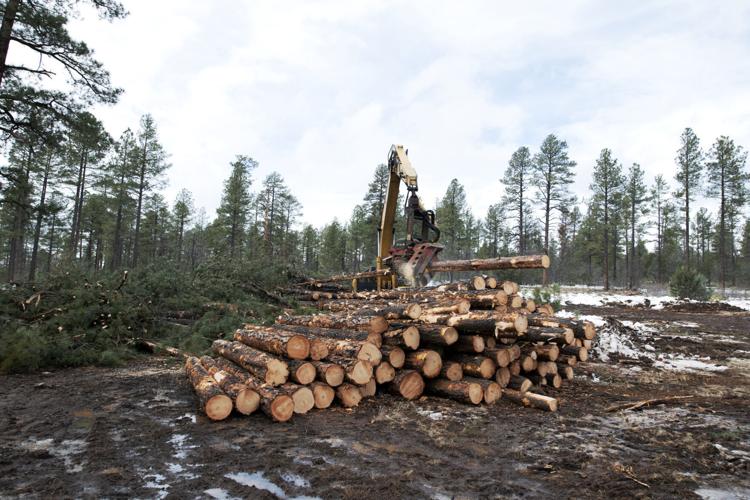The U.S. Forest Service has promised to consider the vehement objections of local loggers and county officials to a plan to declare Arizona timber surplus so an out-of-state timber company can ship big trees to mills in Wyoming.
The Arizona timber industry is begging for more wood to cut, with shortages a threat to forest restoration efforts as well as the survival of a fledgling network of sawmills and the state’s only biomass burning power plant. Forest restoration advocates were aghast to learn at a recent meeting of the Natural Resources Working Group that a Wyoming timber company had convinced Congress to provide a subsidy to ship big logs to its mills from markets with excess timber due to a lack of local industry able to harvest the wood.
The group sent an urgent letter to the Forest Service asking for a meeting to discuss the proposal, saying, “We are asking for your help to find solutions that will protect our communities and the health of our forests and our forest economies.”
The letter said the proposal would contribute to the potential “cannibalization of Arizona forest industries” and endanger the agreement between local governments, industry and environmental groups on how to think the forest by reinventing – and reviving – the state’s timber industry.
The National Forest Service office responded with a letter welcoming the feedback and stressing that the Forest Service is still gathering information on the proposal.
The Forest Service letter said, “A pre-solicitation is intended to share information about projects with prospective bidders and to offer them a chance to ask questions, provide feedback, and help shape a viable solicitation.”
Pascal Berlioux, head of the Eastern Arizona Counties Association, which sponsors the Natural Resources group, said, “No doubt, our questions and feedback have been received, and we will certainly volunteer to help shape a viable solicitation.”
The Forest Service has launched the 4-Forests Restoration Initiative, or 4FRI, in Northern Arizona, the largest single forest restoration effort in the nation. The program seeks to reduce tree densities on some 4 million acres of National Forest lands from about 1,000 trees per acre to more like 100 trees per acre. The plan calls for leaving most of the pines larger than 18 inches in diameter standing, since they’re the key to restoring a low-density, fire-resistant forest. However, the project has struggled to come anywhere close to its goal of clearing 50,000 acres per year for the past decade.
The failure to treat enough acres stems from the struggle of the Forest Service to hire enough people to even process timber sales, as well as the lack of a subsidy to help cope with the low-value biomass that represents the majority of material the loggers must remove or burn after they finish. Estimates suggest that a century of clearcutting, grazing and fire suppression has piled up about 50 tons of biomass on each acre across millions of acres.
The proposed timber sale would have focused just on trees greater than 14 inches in diameter and provided a subsidy so the loggers could haul the material to Wyoming mills and still make a profit.
The industry representatives at the working group meeting said a much smaller subsidy would make it possible to harvest far more wood for local mills, while helping restore a low-density, fire-resistant forest.
Local forest service officials said they hadn’t been consulted on the proposal.
The working group’s letter observed that the existing industry needs 45,000 acres of thinning projects per year to stay in business, but the Forest Service only has the manpower to process 35,000 acres worth of sales. And in 2022, only 22,000 acres were processed.
As a result, Arizona has no surplus wood, especially when it comes to trees larger than 14 inches in diameter. The agreement to leave standing most trees larger than 18 inches resulted in environmental groups, loggers and local officials coming to an historic agreement on the need to rely on industry to restore the forest.
Regional forester Steven Hatt wrote to the group, “We understand this notice created some confusion and created the appearance of a lack of internal alignment. That was not our intent. With this correspondence, we aim to clarify the intent of the pre-solicitation and reiterate our commitment to communication with NWRG and all 4FRI stakeholders.
“As we move forward, we will ensure we listen and share information with stakeholders in a way that demonstrates our commitment to meeting our shared goals. We have shared a similar clarification with all of our employees working on this project so that we all have the same understanding. Please reach out to Deputy Regional Foresters Cecilia Clavet or Steve Hattenbach should you have any questions.”
The group sent copies of the protest letter to Arizona Senators Krysten Sinema and Mark Kelly, as well as the forest service.
It was signed by Navajo County Supervisor Jason Whiting, Gila County Supervisor Woody Cline, Pinetop-Lakeside Lynn Krigbaum, Apache County Supervisor Nelson Davis, Greenlee Supervisor Richard Lunt, Eastern Arizona Counties Organization Director Pascal Berlioux and representatives of Saurez Forestry, Tristar Logging, Novo Biopower, Pallet and Lumber Supply, Canyon Creek Logging, Reidhead Bros. Lumber Mill and Southwest Forest Products.
